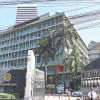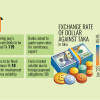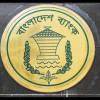BB to adopt crawling peg. Can it end exchange rate volatility?

The Bangladesh Bank is going to adopt a new exchange rate regime known as the crawling peg as per the prescription of the International Monetary Fund (IMF), ruling out the possibility of a market-driven exchange rate many have suggested.
The crawling peg is expected after the central bank failed to end the volatility in the foreign exchange market by adopting various tools. Experts allege that the BB has not implemented the tools in a proper way.
The central bank is likely to introduce the new exchange rate system on January 17 when it is expected to unveil its monetary policy statement (MPS) for the January to June period.
The crawling peg is a system of exchange rate adjustments in which a currency with a fixed exchange rate is allowed to fluctuate within a band of rates. The method fully uses the key attributes of the fixed exchange regime, as well as the flexibility of the floating exchange rate regime.
Currently, only three countries -- Botswana, Honduras, and Nicaragua – use a crawling peg, according to the IMF.
In 2022, some 13.4 percent of the IMF members used the hard peg, 46.9 percent the soft peg, which includes the countries using the crawling peg, and 34 percent floating exchange rates.
Crawling pegs are often used to control currency moves when there is a threat of devaluation due to factors such as inflation or economic instability. At the same time, maintaining a crawling peg imposes constraints on monetary policy like a fixed peg system, the IMF said.
According to the IMF's annual report on exchange arrangements and exchange for 2022 released in July last year, Bangladesh is one of 24 nations that follow crawl-like arrangements. Other nations include Algeria, Gambia, Kenya and Sri Lanka.
Bangladesh's foreign exchange regime has been facing serious volatility for the past two years, with the stock of forex reserves halving and the taka losing its value by about 28 percent.
The reserves stood at $20.18 billion on January 10 from $40.7 billion in August 2021.
The reserves have been declining for the lower receipts in the form of exports and remittances and higher outflows through an elevated level of imports. Capital flight is also blamed for the drying up of reserves.
Currently, the Bangladesh Foreign Exchange Dealers Association (BAFEDA) and the Association and Bankers Bangladesh (ABB) are fixing the dollar rate. Experts say the rate-setting model is not working.
Officially, banks can buy US dollars at Tk 109.5 and sell them at Tk 110. But the unofficial rates are Tk 8 to Tk 10 higher per USD. The exchange rate was less than Tk 90 before the eruption of the Russia-Ukraine war.
Still, importers struggle to secure an adequate supply of the US dollar at the official rate.
Yesterday, the central bank's monetary policy formulation committee held a meeting to decide the next course of their policy to fight higher consumer prices.
According to an official, there will not be a market-based exchange rate. "Rather, the crawling peg will be introduced with assistance from the IMF."
"The crawling peg will not come into effect immediately after the MPS is announced. It will take time since the issue is new for Bangladesh."
In October, the BB assured the visiting IMF staff mission that it would adopt the crawling peg and sought technical assistance on how to implement it.
In a document in December, the IMF said country experiences suggest that developing a credible alternative nominal anchor is a slow process, with an interim arrangement often characterised by a crawling band while policymakers shift to another nominal anchor.
Countries that adopted flexible exchange rates under market pressure, with little preparation, and lack of supporting institutions and policies, faced higher upfront macroeconomic costs.
"Persistent foreign market pressures and the prevailing macroeconomic imbalances, as well as current financial and institutional conditions, might require an expedited transition schedule in Bangladesh," it said.
Ahsan H Mansur, executive director of the Policy Research Institute of Bangladesh, said whatever the method is, it must be executed properly.
"The problem is the government says one thing but does the other. If you want to fix the forex market, you will have to take a supporting policy."
The former economist of the IMF says both policy rates and lending rates will have to increase to stabilise the forex market.
"This is because when the local currency becomes costlier following the hike of the interest rate, it will ease the pressure on the forex market."
The central bank maintained a 9 percent interest rate cap on loans for more than three years since April 2020, flooding the market with cheap funds and making its fight against the raging inflation ineffective.
By the time the ceiling was scrapped in June last year, inflation had crossed 9 percent and it is still showing no signs of abating, hitting the pockets of the low-income groups disproportionately harder.
"The central bank will have to come out of the multiple US dollar rate system," said Mansur.
Mustafa K Mujeri, executive director of the Institute for Inclusive Finance and Development, said the exchange rate should reflect realities.
"There is no discipline in the forex market. Discipline will have to be restored."

 For all latest news, follow The Daily Star's Google News channel.
For all latest news, follow The Daily Star's Google News channel. 








Comments